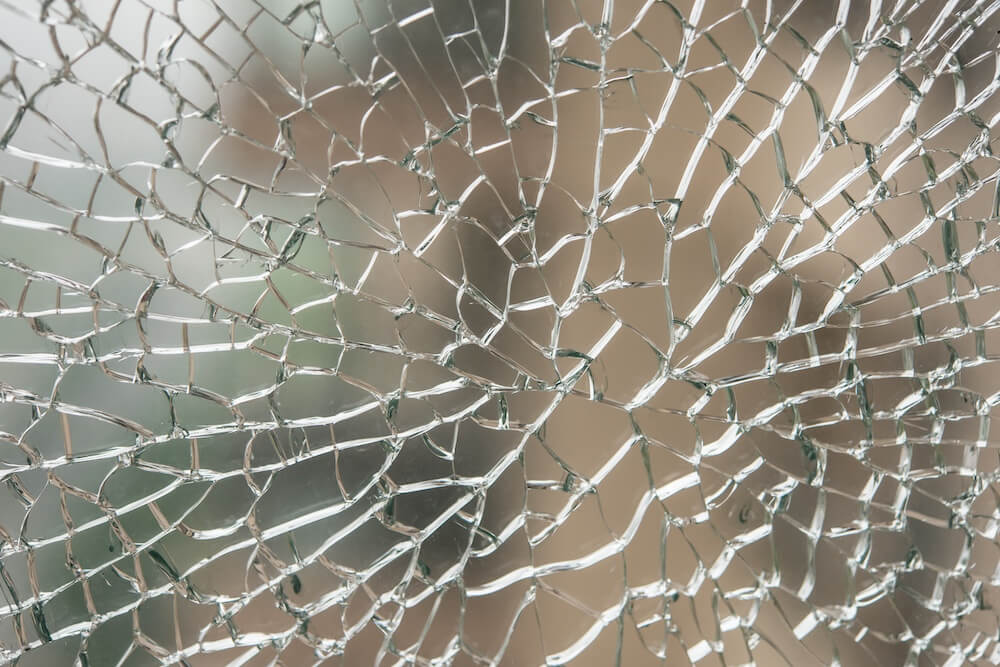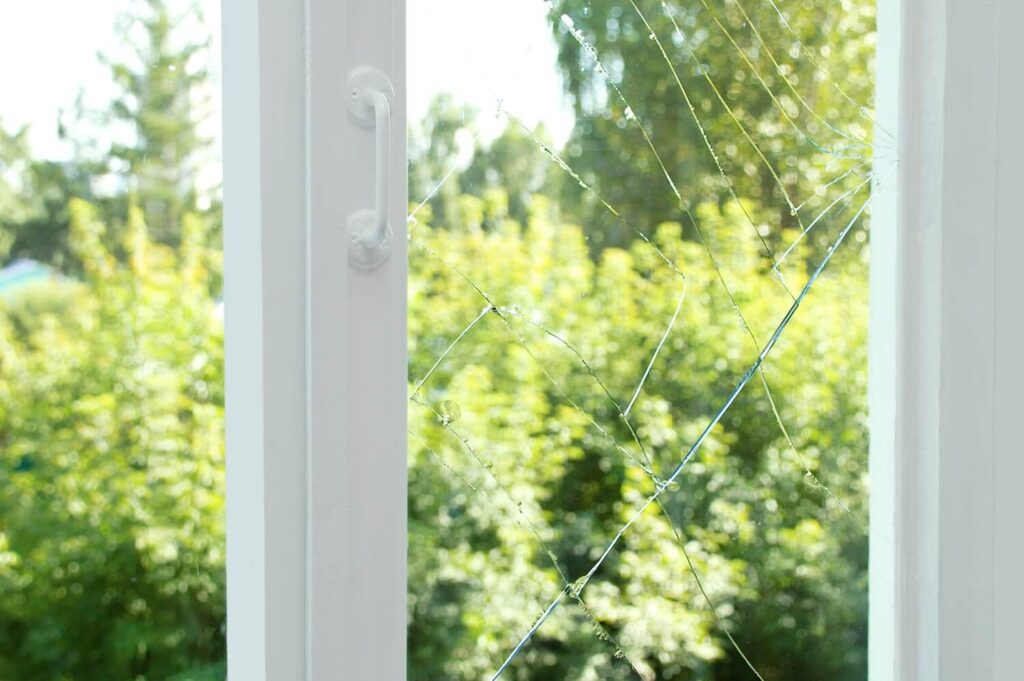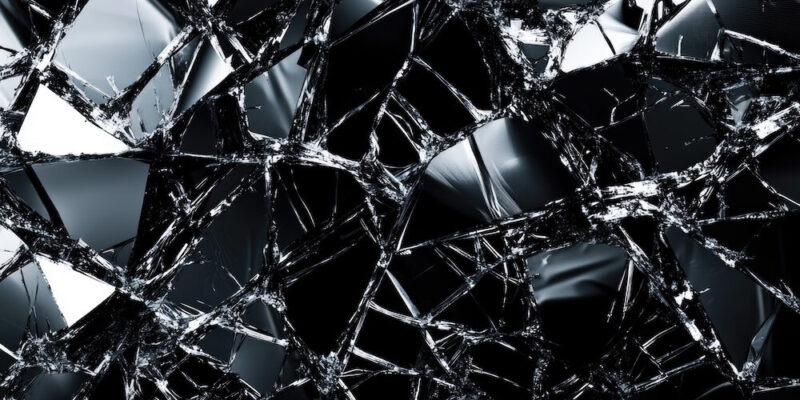Have you ever been relaxing in your home, lost in a streaming boxset only to have your attention stolen by the sound of glass shattering? And when you warily clamber to your feet to investigate, you find that your window or splashback or even shower screen is cracked into crumbs with no culprit in sight?
No? Lucky you!
Actually, modern glass production processes have made spontaneous breakage a relatively rare occurrence. But it does happen – and can be very alarming when it does.
In this post, we’ll look at the reasons why glass can break spontaneously as well as sharing some tips on how to avoid it happening.
What is spontaneous glass breakage?
Spontaneous glass breakage is glass breaking with no obvious cause. No direct impact or identifiable damage.
It happens most often with tempered glass (for reasons we’ll get into) but it can happen in many types of glass. It can also happen to a range of glass objects such as windows, doors, shower screens or glass balustrades.
 What makes glass spontaneously break?
What makes glass spontaneously break?
The name ‘spontaneous glass breakage’ means there’s no reason for it to break. But this isn’t the case. The cause can be impossible to trace after it happens, but there is always something behind it – usually either the quality of the glass, or its installation.
Specifically, it usually boils down to one of the following factors:
Nickel sulfide (NiS) in the glass
The most common reason behind spontaneous glass breakage is nickel sulfide inclusions in the glass. These small internal defects can lead stress to build up in the glass and eventually exceed the strength of the glass so it shatters.
These inclusions can form when nickel and sulphur are in the raw materials used to make glass. They combine during the manufacturing process to form tiny particles of nickel sulfide (nickel sulfide stones) that are trapped in the glass.
These defects are usually too small to see. However, they can make a big impact on the stability of the glass, and can cause the glass to weaken over time. In turn, as the glass weakens, it becomes more likely to shatter due to the internal stress points.
The only way to reduce nickel sulfide stones is by detecting them before the glass is tempered. Even then, it isn’t always possible, but it will reduce the likelihood of spontaneous glass breakage as a result.
Thermal Changes
Glass is a poor conductor of heat. This makes it great at providing insulation in double glazing but also means it expands and contracts slowly.
If it’s exposed to sudden temperature fluctuations, the different parts of the glass expand and contract at different rates. This can cause the glass to crack or even shatter completely. An easy way to see this is if you took a glass dish out of the oven and put it straight into cold water. This temperature change causes thermal stress points in the glass, which weakens it – sometimes to the point of breaking.
Your windows are unlikely to be subjected to such extreme and quick temperature changes. However, the heat of direct sunlight on just one part of a window, or the change between indoor warmth and outdoor cold can weaken glass over time. If this happens too often, the glass can just shatter.
Edge Damage
If your window panes are handled poorly, small chips and scratches can form at their edges. This can weaken the glass, and this weakness can increase over time, leaving the glass susceptible to spontaneous breakage.
Badly Fitting Frames
When being fitted, it’s important to leave allowances for glass to expand and contract with temperature exposure. If this doesn’t happen, the restriction can cause stress on the glass which leads to a spontaneous glass breakage.
Conversely, if there is too much space between the pane of glass and the frame holding it, wind can pass through the gap causing the glass to deflect and bend. Again, over time this will cause stress to the glass and can lead the glass to break.
As you can see, a lot of the cases of spontaneous glass breakage are not actually spontaneous glass breakage at all. It is the glass pane struggling to regulate the stress inside it that toughens/tempers it.
 How to Prevent Spontaneous Glass Breakage
How to Prevent Spontaneous Glass Breakage
It is essentially impossible to fully prevent spontaneous glass breakage. So many factors can cause it, many of them difficult to predict. However, there are some steps you can take to reduce the chances of it happening.
A lot of the risk to glass caused by thermal stress is unavoidable. Having a window that faces the sun is quite nice actually, and that will always need glass in it.
- Careful installation
Getting your windows installed by an experienced expert has many benefits to protect the life span of your windows including reducing the chance of spontaneous breakage. Over the years they will have learned what to do – and what not to do – to make sure your windows are installed correctly. They’ll even be more likely to know how to spot if something is wrong so they can address it. - Choose laminated glass
While there is a lot to recommend tempered and toughened glass, the treatment process does bring about a risk due to any nickel sulphide inclusions. Laminated glass doesn’t undergo the same production method meaning it isn’t at risk of breakage as a result of sulphide stones – but this type of safety glass may have other drawbacks so you should weigh your choice against your needs carefully. - Heat soaking
Heat soaking can be included in the glass manufacturing process to reduce the chance of breakage as a result of nickel sulphide inclusions. It involves an extra heat cycle that activates nickel sulfide expansion and accelerates it – creating the same degradation that would otherwise happen over years. If there is a potential problem, this will cause the glass to shatter during the heat soaking process instead of while in use.Heat soaking is not a common practice however. Nickel sulphide inclusions are relatively rare, and in the majority of cases the risk of spontaneous breakage is too small to make heat soaking necessary. However, if you’re looking for glass that is going to be used at height or any other high risk area, it can be worth exploring the possibility of heat soaking.
- Inspect your glass regularly
Unfortunately, inspecting your glass for any signs of weakening or damage won’t actually prolong it’s life. However, it can help you spot the potential for breakage before it occurs so you can get the replace your double glazed glass without having to worry about cleaning up a heap of broken glass.
What to do if your glass breaks unexpectedly?
Unfortunately, spontaneous glass breakage tends to leave the entire pane broken (particularly with tempered/toughened glass). This means your only option is to replace the entire pane.
Here at KLG Glass we can replace your double glazed window units with high-quality that is expertly installed. We will take every possible step to make sure your new window does not meet the same fate as the last. Talk to us today to find out more about how we can make sure your windows have the longest possible lifespan with the highest performance too.

